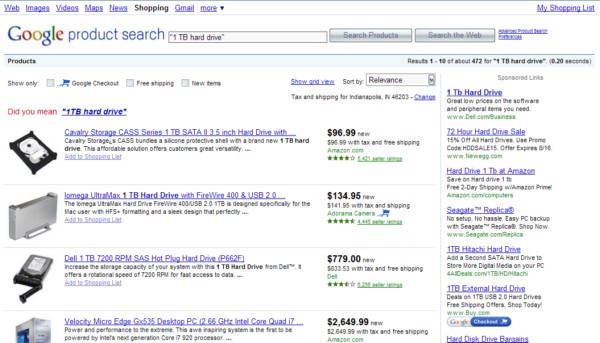
Statistics: Firefox 3.5 surpassed IE7 in global usage share last week
At some time during the middle of last week -- quite possibly, on the very day that Microsoft announced its settlement with the European Commission -- Web analytics firm StatCounter registered more Web site hits coming from Web browsers announcing themselves as Mozilla Firefox 3.5 than from either Internet Explorer 7.0 or IE8.
According to the fairest interpretation of StatCounter's data, that means Firefox 3.5-branded browsers are more actively used, on all platforms including Linux, than any single version of any other browser, including IE. As of Monday morning, FF 3.5 was responsible for 21.93% of HTTP requests tracked by StatCounter, versus 21.2% of requests from IE7, 20.33% from IE8 (buoyed recently by Windows 7's success), and 13.89% from IE6.

10 things Microsoft did wrong in 2009
Earlier today, I posted "10 things Microsoft did right in 2009." I originally planned to post the did-wrong list tomorrow. But in view of today's news about Microsoft's out-going chief financial officer, Chris Liddell, I changed the timetable. Liddell's departure is one of the things Microsoft did wrong in 2009 (He will become CFO at GM).
The did-wrong list was way too much easier to compile than the did-right list. I could easily put 20 items here. The year 2009 was perhaps the most difficult for Microsoft since Bill Gates and Paul Allen founded the company nearly 35 years ago. Company executives can thank economic turmoil for the hardships. But Microsoft could have handled 2009 much better than it did. Hopefully, 2010 will be better.

Microsoft's interoperability pledge not free enough for Free Software
The agreement between the European Commission and Microsoft announced last Wednesday did not mention "Free Software" by name. There is no corporation or partnership by that name, at least not officially, though up until the resolution of the dispute last week, there had been occasional hints from outgoing Commissioner for Competition Neelie Kroes that any agreement with Microsoft must take "free" into account, almost as though it were "Free Software, Ltd."
It's a very serious issue for many European developers, as Free Software had been treated as a worthy-of-all-caps entity in drafts of the European Interoperability Framework from last year. But recent discussions on revising the EIF have included suggestions from many sources, including a controversial one from the Polish government, that strike references to Free Software as a legal entity, especially as one that deserves equal protection as a limited legal body.

Live Poll: Are we done with Microsoft, Microsoft, Microsoft?
With Microsoft promising to abide by new interoperability standards for PCs, while losing ground in mobile, should it remain the focus of our interests in 2010?(opinion)
We exit 2009 with what appears to be the first sign of a plate-tectonic shift in both consumer and business technology -- specifically, a shift in interest and focus. It's a broader world out there, full of new and old companies with different names and real technology agendas that suddenly seem very realistic. Could we really be emerging into that competitive playing field that so many technologists had been seeking for so long?
It's not that we're emerging into a world without Microsoft (some of us technology journalists wouldn't be able to continue breathing). But even Microsoft's successes in 2009, Windows 7 being the biggest among them, have helped take the focus away from Vista as a roadblock to evolution. And Microsoft's biggest failure in 2009 -- the lack of a new Windows Mobile -- has helped turn consumers' attention toward Google as the biggest perceived threat to Apple's iPhone in the mobile space.

The mobile shopping Web isn't evolving in step with consumers' needs
The year 2009 is expected to be the first when mobile phones start gaining real traction in holiday shopping. Nearly one in five consumers will use a mobile device to assist in their holiday shopping this year, according to Deloitte's most recent Annual Holiday Survey of retail spending and trends. Shoppers will use their mobile devices to find store locations, research prices, find product information, get coupons, read reviews and more. An estimated one in four consumers will even make a holiday purchase with their phone, representing a sizable chunk of potential sales.
It's little wonder then that retailers are showing more interest than ever before in the mobile Web. Recent Nielsen data shows that the mobile Web audience in the US grew a whopping 34 percent between July 2008 and July 2009, in spite of the economic climate and otherwise bleak consumer spending. Ironically, the down economy may be a key factor luring consumers to the mobile Web this holiday season, as they use their mobile phones to compare prices and find the best bargains, even in real-time as they peruse malls and stores.

Apple's iPhone carrier woes extend to the UK with O2 3G outage
2:30 pm EST December 21, 2009 · UK-based carrier O2 is now saying, through its Twitter feed, that the fault related to iPhone data service outages throughout Britain has been fixed. Customers may continue to see some delay, however, before their service is fully restored.
As of late Monday afternoon in the UK (late Monday morning in the US), a data network outage continues to impact O2 network customers -- specifically those using Apple iPhone 3G and 3G S models. O2 acknowledged the problem yesterday via Twitter, and once again this morning.

10 things Microsoft did right in 2009
The year 2009 was pretty good to Microsoft, even as the weak economy ravaged sales. Microsoft actually did a few things right. The did-wrong list will come later today (not tomorrow as previously posted). For now, I present the list of 10 things Microsoft did right in 2009 -- in no order of importance. They're all important. Microsoft:
1. Flawlessly launched Windows 7. There's a metaphor somehow in Microsoft launching Windows 7 during the 40th anniversary year of the Apollo moon landing. Microsoft's precision reminds of NASA sending man to the moon. While the human risk wasn't as great and many of the engineering challenges were far less than Apollo 11, Windows 7 needed perfect launch and delivery, from testing to release candidate to voluming licensing availability and retail release. Microsoft pulled it off.

10 last-minute gifts for geeks
It's the last shopping weekend before Christmas and perhaps you just don't know what to give that special geek in your life. I've prepared a list of 10 gifts, none of which might make your holiday list without a little prodding. I intentionally picked gifts I would want to give that you might not think to give. If you've got other, hopefully better, ideas, please share them in comments. A list of 10 suggestions isn't enough.
1. Panasonic Lumix LX3K -- Earlier this week, Amazon had this compact digital camera for $398.95 but sold out. Adorama lists the camera for $499.95, but the price drops to $398.95 in the shopping cart. B&H Photo offers the LX3K for the same price. Four hundred bucks is simply an excellent price for what is one of the most versatile compact digicams available -- and it's suitable for novices or pros.

'Operation Chokehold' shows the social media mob has influence
"Operation Chokehold" has come and gone, with no sign it even put AT&T in a headlock. But with so many people complaining of service already so spotty, could anyone really tell the difference short of network failure? For AT&T, there is little victory in surviving the coordinated, customer-driven denial-of-service attack. The publicity has done damage enough, and, as I blogged yesterday, everything is different now for companies looking to manage their brands and customer relations.
Dan Lyons, writing as Fake Steve Jobs, called for Operation Chokehold -- a coordinated effort by AT&T users to overwhelm the network with heavy data requests -- at 3 p.m. ET today. Lyons started backpedaling on December 16, perhaps after realizing that Operation Chokehold had become a serious movement, with a Facebook fan page and buzz spreading across social networks, blogs and the news media.

Firefox 3.6 Beta 5 moves ahead, but more work to be done
Download Mozilla Firefox 3.6 Beta 5 for Windows from Fileforum now.
Betanews tests with the latest Beta 5 release of Mozilla Firefox 3.6 show some respectable performance improvements, in the race to catch-up to Google Chrome. One of those improvements -- the full impact of which we'll see over time, as Web servers improve their scripting to support it -- is asynchronous scripting. It's a feature added to the HTML 5 standard, and Firefox 3.6 will be the first browser to support it.

Verizon: Even with higher termination fees, we still lose money
Verizon has filed its response to a December 4 Federal Communications Commission probe which examined the carrier's recent increase to early termination fees for subscribers with "advanced devices" such as BlackBerry, Windows Mobile, Android and Palm handsets.
The FCC asked why such an increase was necessary, how customers are informed of the new fees, and why the fee is not prorated all the way down to zero.

Cisco acquires 4G tech vendor Starent Networks for $2.9B
Today, Cisco announced that it has completed its acquisition of Starent Networks, a name that has been popping up in greater frequency as wireless networks evolve into their next generation.
Starent deals in core multimedia technology used in all types of mobile radio networks, and has made a strong showing in emerging technologies. Just this year, the company became a partner in Verizon's LTE deployment, it has worked with 3GPP on new Femtocell standards, and launched a

Slow performance may have triggered Visual Studio 2010 delay
A delay of what Microsoft Developer SVP S. Somasegar calls "back a few weeks," in the final release of Visual Studio 2010 and its accompanying .NET Framework 4, is the apparent result of performance issues that beta testers would not let rest.
Somasegar's post yesterday afternoon started out by saying, certainly you've noticed how VS 2010 Beta 2 is faster than Beta 1: "As you may have seen, we significantly improved performance between Beta 1 and Beta 2." But then he transitions smoothly into an admission of just the opposite: "Based on what we've heard, we clearly needed to do more work. Over the last couple of months, our engineering team has been doing a push to improve performance. We have made significant progress in this space since Beta 2."

Add-ons make Google Chrome for Linux beta competitive against Firefox
Download Google Chrome Dev version 245.1 for Linux from Fileforum now.
Google finally released a beta version of its Chrome Web browser for Linux on December 8, slightly more than one year after releasing its Chrome browser for Windows. The wait was worth it, especially given the more than 300 extensions already available to customize the new browser.

Live Poll: Should Facebook give you your privacy?
Now that Facebook has altered its privacy policy for users, what statement best reflects your personal stance on social networks' privacy policy?(polls)
Last week's change to Facebook's privacy policy resulted in tens of thousands of users being directly confronted with a choice over how Facebook should change its stance. The initial result was confusion, but as folks worked out what the question really meant, they came to a discovery that they were not only being asked, but encouraged, to turn off their privacy settings altogether as a benefit to "Everyone" -- Facebook's new default class.
Now, the group that helped focus the US Federal Trade Commission's attention on Google has turned its sights on Facebook, initiating a complaint action yesterday that could lead to a federal investigation of the subject. Expect Congress to follow suit at some point, perhaps calling Facebook executives to the witness stand. In advance of the coming debate, where do you stand on the subject? That's Betanews Live Poll for this Friday.



